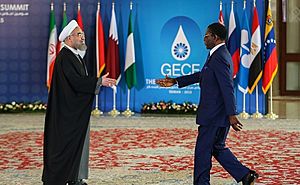Teodoro Obiang Nguema Mbasogo facts for kids
Quick facts for kids
Teodoro Obiang Nguema Mbasogo
|
|
|---|---|
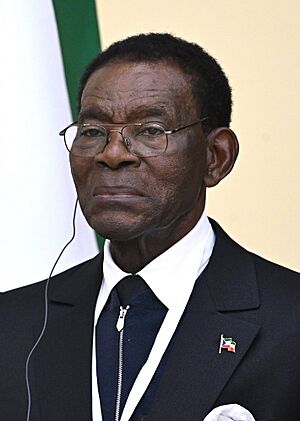
Obiang in 2023
|
|
| 2nd President of Equatorial Guinea | |
| Assumed office 12 October 1982 |
|
| Prime Minister |
See list
|
| Vice President |
See list
|
| Preceded by |
|
| Chairman of the Supreme Military Council | |
| In office 3 August 1979 – 12 October 1982 |
|
| Deputy |
See list
|
| Preceded by | Council established |
| Succeeded by | Council dissolved; Himself (as President) |
| 9th Chairperson of the African Union | |
| In office 31 January 2011 – 29 January 2012 |
|
| Preceded by | Bingu wa Mutharika |
| Succeeded by | Thomas Boni Yayi |
| Personal details | |
| Born | 5 June 1942 Acoacán, Spanish Guinea |
| Political party | Democratic (since 1987) |
| Other political affiliations |
|
| Spouse |
Constancia Mangue
(m. 1968) |
| Children |
|
| Relatives |
|
| Alma mater | Colegio Nacional Enrique Nvó Okenve |
| Military service | |
| Allegiance |
|
| Branch/service | Armed Forces of Equatorial Guinea |
| Years of service | 1968–1982 |
| Rank | Major general |
| Commands | Chief of General Staff |
Teodoro Obiang Nguema Mbasogo (born 5 June 1942) is a politician and former military officer from Equatorial Guinea. He has been the second president of Equatorial Guinea since 1982. Before that, he led the Supreme Military Council from 1979 to 1982. As of 2025, he is the longest-serving non-royal national leader in the world.
After studying at a military school in Spain, Obiang held several important jobs under his uncle, Francisco Macías Nguema, who was the president at the time. Obiang removed his uncle from power in a military takeover in 1979. He then became president and chairman of the Supreme Military Council.
In 1982, the country returned to civilian rule, and Obiang founded the Democratic Party of Equatorial Guinea (PDGE) in 1987. This party was the only legal one until 1992. Since the 1990s, Equatorial Guinea has become an important country for oil production under his leadership. Obiang also served as the Chairperson of the African Union from 2011 to 2012.
Obiang is seen as a leader who holds a lot of power. His government has been accused of not being fair and of misusing power. Under his rule, Equatorial Guinea has faced challenges with human rights. The country is mostly controlled by Obiang's PDGE party, which holds almost all the power in the government. The country's constitution gives Obiang wide-ranging powers, allowing him to make decisions by special order. He has also placed members of his family in important government jobs.
Contents
Early Life and Military Career
Teodoro Obiang Nguema Mbasogo was born on 5 June 1942 in a town called Akoacám in Spanish Guinea. This area is now part of Equatorial Guinea, near the border with Gabon. He was one of ten children. His parents moved from Gabon to Spanish Guinea for better economic opportunities.
Obiang went to school in Ebibeyin and Bata, where he studied labor administration. He later joined the Colonial Guard during the time Equatorial Guinea was a colony of Spain. He also attended the General Military Academy in Zaragoza, Spain.
After his uncle, Francisco Macías Nguema, became the country's first president, Obiang became a lieutenant. He held various roles, including governor of Bioko island and leader of the National Guard. He was also in charge of Black Beach Prison, which was known for its harsh conditions.
Becoming President
The 1979 Change in Leadership
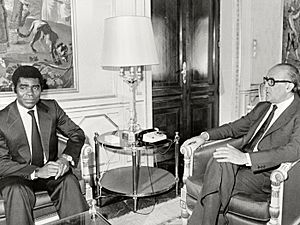
Obiang's uncle, President Macías, ordered the deaths of several family members. Because of this, Obiang and others close to Macías became concerned about the president's actions. On 3 August 1979, Obiang led a military takeover and removed his uncle from power.
Macías was put on trial for his actions, including harm to the Bubi people. He was found guilty and executed on 29 September 1979. It is said that a special guard from Morocco had to carry out the execution because local soldiers were afraid of Macías's supposed magical powers.
Obiang announced that his new government would be different from Macías's harsh rule. He allowed political prisoners to be freed and ended forced labor. He also reversed some of the strict rules, like banning glasses and Christianity. However, he did not talk much about his own role during his uncle's time in power.
New Rules and Elections
In 1982, Equatorial Guinea officially returned to civilian rule with a new constitution. Obiang was elected president for a seven-year term. He was the only candidate in that election. He was sworn in on 12 October, which was the 14th anniversary of the country's independence from Spain.
He was re-elected in 1989, again as the only candidate. In 1992, other political parties were allowed to form. However, Obiang was re-elected in 1996 and 2002 with very high percentages of the vote. International observers said these elections were not fair. For example, in 2002, one voting area reportedly gave Obiang more than 100 percent of the votes.
He was re-elected for a fourth term in 2009 with 97% of the vote. This election also faced accusations of unfairness.
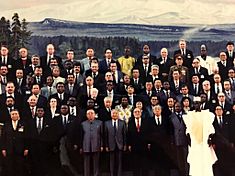
Obiang's government is seen as having a lot of control. Most observers believe it is one of the most controlled governments in the world. Equatorial Guinea is largely a one-party state, meaning Obiang's Democratic Party of Equatorial Guinea (PDGE) holds most of the power. The constitution gives Obiang broad powers, including the ability to make laws by special order.
Even though other parties were allowed in 1992, the PDGE still controls the legislature. There have been very few opposition members in the lower house, and the PDGE has held every seat in the Senate since 2013. This means Obiang holds almost all the power in the country.
The opposition parties have little freedom. In 2006, Obiang was quoted asking, "What right does the opposition have to criticize the actions of a government?" There are no independent newspapers, and all TV and radio stations are either owned by the government or controlled by its supporters.
International Relations
Relations with the United States
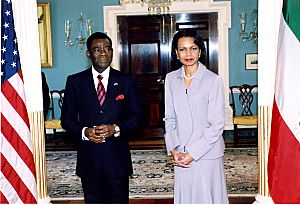
Equatorial Guinea's relationship with the United States became difficult in 1993. The US Ambassador at the time, John E. Bennett, was accused of witchcraft. He left after receiving a threat in 1994. The US embassy in Malabo closed in 1996.
Things changed after the September 11 attacks in 2001. The United States began to focus more on its relationships with key African countries. In 2002, a US official stated that African oil was very important for US national interests.
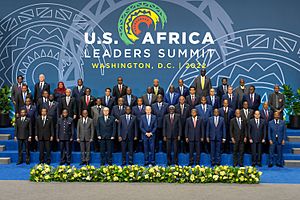
In 2006, President Obiang visited the US and wanted the closed embassy to reopen. He said that without a US diplomatic presence, economic growth was being held back. Secretary of State Condoleezza Rice welcomed him warmly.
A public relations company may have helped improve the relationship between Obiang and the US government. This company was paid a large amount of money by Equatorial Guinea. However, by October 2006, there were concerns about building a new embassy on land owned by Obiang, due to accusations of human rights issues. The new embassy opened in 2013.
Relations with Other Nations
Equatorial Guinea has friendly relations with neighboring Cameroon. However, there have been some issues, including a maritime border dispute. The Fang ethnic group, which is the majority in mainland Equatorial Guinea, also lives in parts of Cameroon and Gabon. Cameroon sells some food to Equatorial Guinea and buys oil from it. In 2008, Cameroon closed its border after some incidents involving security forces.
In the 1970s, Equatorial Guinea made agreements with many socialist countries, including North Korea. North Korea sent advisors to Equatorial Guinea. After Obiang took power in 1979, the family of the former president fled to Pyongyang, North Korea. Despite this, close ties between the two countries continued. In 2013, President Obiang received an award from a North Korean delegation. In 2018, Equatorial Guinea reported that it had stopped economic ties with North Korea to follow United Nations rules, but North Korea said their friendly relations continued.
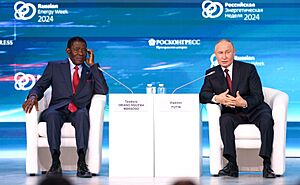
On 26 September 2024, Obiang visited Moscow and met with Russian President Vladimir Putin. Putin noted that Russia and Equatorial Guinea work well together in OPEC+, a group of oil-producing countries.
In August 1979, Spain offered to help during the coup. Between 1979 and 1983, Spain provided financial aid to Equatorial Guinea. Relations almost broke down again in 1983 over debt issues. During a coup attempt in 2004, President Obiang accused Spain of knowing about it, but Spain denied the claims. In 2016, trade between Equatorial Guinea and Spain was significant, with oil being 90% of Equatorial Guinea's exports to Spain. Spain exports various goods to Equatorial Guinea, including drinks, furniture, and vehicles.
Economy and Development
For a long time, Equatorial Guinea's economy struggled, relying on foreign aid. This changed in 1995 when ExxonMobil found oil in the country. Large oil discoveries since then have made Equatorial Guinea a major oil producer in Sub-Saharan Africa.
The income from oil led to a rapid increase in wealth for the country. According to UNESCO, Equatorial Guinea has a high adult literacy rate in Sub-Saharan Africa, around 95 percent. It also has the highest income per person in Africa. However, most of this wealth is not shared equally and is held by the ruling family.
President Obiang's personal wealth is estimated to be very high, making him one of the richest heads of state. Yet, more than three-quarters of the population lives below the poverty line. The country's Human Development Index (HDI), which measures well-being, ranks 145th out of 191 countries. Much of the oil money has been used for large building projects, often involving companies connected to President Obiang's inner circle. Education and health receive a small part of the national budget. Oil production has been decreasing since 2012, and reserves are expected to run out by 2035.
Building a New Capital City
In 2012, Obiang ordered the construction of a new planned city called Ciudad de la Paz. This location was chosen because it is easy to reach and has a milder climate. It is also on the mainland, unlike the current capital, Malabo, which is on an island. The city was designed by a Portuguese architecture firm.
The new capital is planned to have about 200,000 residents, a new Parliament building, and many presidential homes. The construction has faced some delays. All building materials are imported from other countries.
Human Rights and Laws
In 2006, Obiang signed a decree against torture, banning all forms of abuse in Equatorial Guinea. In 2007, Black Beach prison was renovated to ensure better treatment of prisoners. However, human rights organizations like Human Rights Watch and Amnesty International have reported that abuses, including unfair detention, still happen in prisons.
In 2020, Transparency International gave Equatorial Guinea a low score on its Corruption Perceptions Index, which measures how corrupt countries are seen to be. This means the country is perceived as having high levels of public corruption. As of 2023, Equatorial Guinea ranks 120th out of 180 countries, with lower scores indicating more perceived corruption.
Ending the Death Penalty
In September 2022, Obiang signed a law that officially ended the death penalty, making it an illegal punishment. The last execution in the country had taken place eight years earlier, in 2014. This step was seen as an improvement in human rights and was praised by other countries.
Personal Life
Teodoro Obiang married Constancia Mangue Nsue Okomo on December 12, 1968. In 2006, it was reported that Obiang favored his son Teodoro Nguema to take over as leader after him.
Honours
 Bolivia:
Bolivia:
 Eswatini:
Eswatini:
 Philippines:
Philippines:
 Serbia:
Serbia:
 Spain:
Spain:
 Collar of the Order of Isabella the Catholic (December 1979)
Collar of the Order of Isabella the Catholic (December 1979)
 Suriname:
Suriname:
 Uganda:
Uganda:
See also
 In Spanish: Teodoro Obiang Nguema para niños
In Spanish: Teodoro Obiang Nguema para niños
 | George Robert Carruthers |
 | Patricia Bath |
 | Jan Ernst Matzeliger |
 | Alexander Miles |


